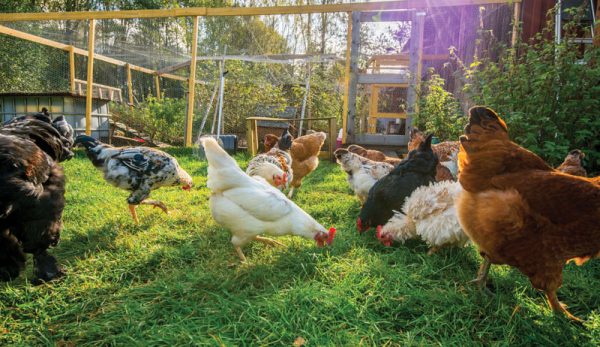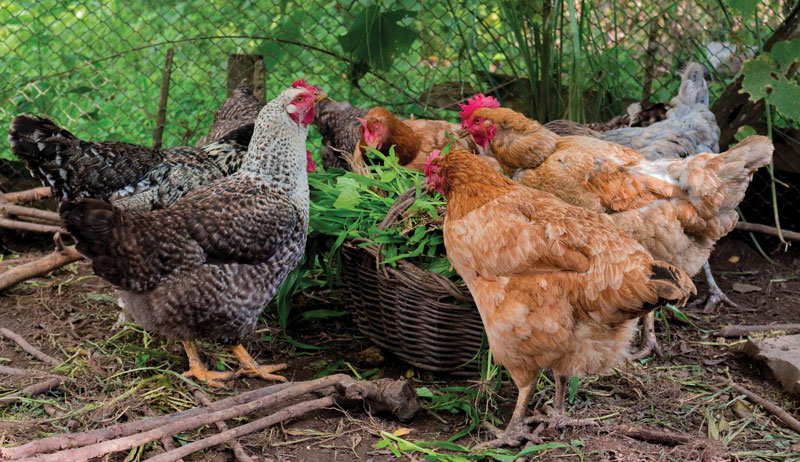
A column about worms and your chickens may give the heebie-jeebies, but remember that with knowledge comes power. Learning the basics of worms, how to prevent them in your flock and how to treat them will help your chickens live a healthy life.
Worms are basically parasites that live in your chicken’s digestive system. They typically don’t kill your chickens (any parasite wants to keep the host alive). But moderate infections can result in emaciated chickens and birds that show signs of diarrhea.
In addition, severe cases can cause impaired feed efficiency and production. In extreme cases (i.e., heavy parasitic loads and co-infections), some worms can cause relatively high mortality rates. To that point, when owners see worms in their chickens’ poop, they commonly ask, “Should we worm our chickens?”
Like most things in medicine, I would answer, “It depends.”
It’s definitely not normal when chickens have a lot of worms. However, “normal” loads of most worms are relatively harmless. In fact, having some worms helps generate a robust immune response.
This means treatment needs to be based on clinical signs consistent with worm infestation and, in some cases, a clinical diagnosis. A measured approach helps reduce the potential for resistance to dewormers and helps avoid loss of eggs associated with post-treatment withdrawal times.
This article will provide some basic information on common worms, how to prevent them and when to treat.
Know Your Enemy
As noted, worms are very common. And at some point, most chicken owners have to deal with them. However, all worms aren’t created equal, making identification an important step when assessing the significance when finding worms.
While many different types of worms can parasitize chickens, for this article we’ll focus on the five most common types.
- large roundworms
- thread or capillary worms
- cecal worms
- tapeworms
- gape-worms
The following is a brief description of the most common worms mentioned above and in “Common Internal Parasites,” below.
Read more: Protect your poultry against the H5N1 avian influenza outbreak.
Roundworms
Roundworms, or ascarids, are very common in backyard poultry. Adult worms grow to about 1 1⁄2 to 3 inches long by approximately 1⁄8 of an inch wide. Extensive infection may reduce egg production.
Death may occur due to intestinal obstruction in immunosuppressed birds or those with a co-infection of a second disease.
Capillary Worms
You’ll find capillary worms, or capillaria, in the crop or esophagus and capillaria eggs in the lining of the intestines. They may cause thickening or inflammation of the crop tissue and focal lesions in the intestinal tract.
Severe infestation may lead to mortality.
Cecal Worms
Cecal worms are found in the ceca of chickens, in the lower gastrointestinal tract. The worms themselves don’t pose a major threat. But they can carry the agent that causes blackhead disease, or histomoniasis. Histomoniasis affects chickens but is primarily associated with mortality in turkeys.
Consequently, you shouldn’t raise turkeys in the same environment as chickens. Chickens can carry the relatively common cecal worms.
Tapeworms
Tapeworms, or cestodes, are flattened, ribbon-shaped worms composed of numerous segments or divisions that live primarily in the intestinal tract. Infections result in emaciation in mature flocks, especially if severe infestation is exacerbated by malnutrition or immunosuppression.
Depending on the species, tapeworms can grow more than five inches.
Gapeworms
Gapeworms, or Syngamus, are found in the trachea and respiratory tree. These worms are also called “forked worms” because the male and female worms are always locked in copulation and form a “Y.”
The term “gapeworm” comes from a heavily-infected bird’s tendency to gasp or “gape.” Worms can grow up to 1 inch and block the trachea, causing suffocation. Chicks suffer the most danger because of their relatively small trachea.
Diagnosis
You can diagnose the worms listed previously in a variety of ways. With a high load, you’ll see roundworms and tapeworms with the naked eye in feces. You can take a fresh fecal sample to your veterinarian to identify worms present in the GI tract. Ask for a fecal flotation test or a fresh smear of feces.
Postmortem examination of mucosal scrapings of affected tissue (respiratory or intestinal) can also help in gauging the health status of the remainder of your flock.
Chickens can pick up worms and their eggs from the feces of other chickens or birds—including wild birds. Often insects act as the intermediate host by carrying worm eggs, which then get deposited in the chicken after they ingest the insect.
In general, you’ll find worms in the respiratory or intestinal tract.

Breaking the Cycle
Prevention of disease is always more desirable than treatment. To do this, we need to understand the environmental conditions worms thrive in along with how they reproduce and infect their host.
While worms and their eggs will always be present at some level within the poultry environment, you can mitigate their ability to cause disease with proper husbandry and management of your flock and their environment. In general, control measures should focus on sanitation, interruption of the life cycle and the strategic use of efficacious dewormers.
Keep the coop and surrounding area clean. Lack of cleanliness commonly causes poultry disease.
Several general sanitation measures to take include:
- the complete cleaning and disinfecting of house and equipment before starting baby chicks or housing layer
- daily cleaning of waterers
- keeping litter dry and clean
For example, help control tapeworms by reducing the flies that act as intermediate hosts. And control flies through proper manure management and overall general cleanliness.
If at all possible, after a heavy infection, move your flock to land that has not been occupied by chickens. Any area that has manure on it consistently will eventually have a high load of bacteria, viruses and parasites.
Biosecurity
Practice good biosecurity. Worm eggs infect new facilities through contaminated equipment. Make sure to not share equipment with other flocks before properly disinfecting it.
In addition, controlling worms presents a challenge in backyard flocks due to the common presence of mixed-aged flocks. In mixed-aged flocks, older, apparently healthy chickens can shed eggs in their feces and subsequently infect the younger chicks.
If you do have mixed-aged flocks, consider treating or testing the older birds before introducing chicks.
When & How to Treat
In general, only eggs and poop should come out of the vent. Seeing worms likely indicates an unhealthy worm burden. If one or two of your chickens carry high worm burdens, treat the entire flock.
All of the chickens share the same environment.
While other medications are effective against internal parasites, Piperazine is the only FDA-approved treatment for internal parasite in meat- and egg-producing birds. Resistance does occur, though. So it’s important to use only when necessary, such as after you see or diagnose worms or have seen clinical signs.
Other drugs listed in “Common Internal Parasites ” are considered extra-label. Their use requires a prescription from a licensed veterinarian. Piperzine is added to drinking water. Take special care to use dechlorinated water (the case with any medication added to water.)
For any drug, refer to the Food Animal Residue Avoidance Databank with respect to the most up-to-date information on withdrawal times for eggs and meat, which may be different.
Read more: Should you give your chickens wet food?
Proper Worming
While Piperazine has a relatively wide spectrum of activity, it isn’t effective against all of the different worms we’ve discussed. Another concern: Different worms can develop resistance to Piperazine and other treatments over time.
Consequently, limit use of Piperzine and other dewormers to treating specific problems. Scheduled “worming” may not be advisable. Before you worm, ask yourself, “Why?”
Good management will go a long way toward protecting your flock from worms and other diseases. If your flock is showing clinical signs of worm infestation and you’re able to identify the type(s) of worms present, the treatments mentioned in this column should be considered.
More Information
Common Internal Parasites
Here are five common internal parasites backyard chicken-keeper might find in their flocks, the symptoms caused and what treatment to follow.
Note: Piperazine is the only FDA-approved treatment for internal parasites in meat- and egg-producing birds. Other drugs listed are considered extra-label, and their use requires a prescription from a licensed veterinarian.
Roundworms (aka ascarids)
- Symptoms: long, yellow-white worms in intestine, droopiness, weight loss, diarrhea, death
- Treatment(s): Albendazole, Fenbendazole, Ivermectin, Levamisole, Piperazine
Roundworms (aka capillary worms)
- Symptoms: hairlike worms in crop and upper intestines, oral inflammatory masses, hemorrhagic inflammation of commissure of beak droopiness, weight loss, death
- Treatment(s): Albendazole, Fenbendazole, Ivermectin, Levamisole
Cecal Worms
- Symptoms: short worms in the ceca, unthrifty, weakness, weight loss
- Treatment(s): Albendazole, Fenbendazole, Ivermectin, Levamisole
Tapeworms
- Symptoms: long, white, flat segmented worms in intestine, unthrifty, slow growth, weakness
- Treatment(s): Albendazole
Gapeworms
- Symptoms: red, forked worms in trachea, gasping, coughing
- Treatment(s): Ivermectin, Fenbendazole
Are You at Risk?
The worms mentioned in this column aren’t “zoonotic.” They don’t cause disease in humans.
However, several other diseases that chickens carry are zoonotic, including the bacteria campylobacter along with salmonella. Therefore, always wash your hands after handling your chickens.
This article originally appeared in the March/April 2022 issue of Chickens magazine.




